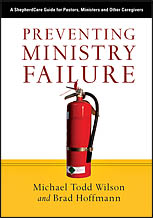Book Review: Preventing Ministry Failure
Wilson, Michael Todd & Brad Hoffmann. Preventing Ministry Failure: A ShepherdCare Guide for Pastors, Ministers and Other Caregivers. Downers Grove, Ill: IVP Books, 2007. 265 pages, Paperback. $16.00.
(Review copy courtesy of InterVarsity Press.) Purchase: IVP | CBD | Amazon
Purchase: IVP | CBD | Amazon
Special Features: 7 Appendices
Sample Chapter: Table of Contents![]() Getting the Most from This Workbook »
Getting the Most from This Workbook »![]() Introduction: Why Preventing Ministry Failure Is So Important »
Introduction: Why Preventing Ministry Failure Is So Important »![]() 1. Intimacy: Connecting to the Heart of Successful Pastoring »
1. Intimacy: Connecting to the Heart of Successful Pastoring »
ISBN: 0830834443 / 9780830834440
LCCN: BV4647.S9W54 / DCN: 253.2
Subjects: Christian Ministry, Pastoral Care, Accountability
Michael Todd Wilson is a licensed professional counselor and Life Coach with the Intimacy Counseling Center in Duluth, Georgia. He is currently serving as director and co-founder of ShepherdCare. He earned a Master of Science in Counseling from Georgia State University as well as a Certificate in Christian Counseling from Psychological Studies Institute. He is the coauthor of Soul Virgins: Redefining Single Sexuality (Baker Books, 2006).
Brad Hoffmann is senior pastor of Memorial Baptist Church in Baytown, Texas, and co-founder of SherpherdCare. He earned a Master of Divinity degree from Southwestern Baptist Theological Seminary and is a currently a candidate for his Doctor of Ministry in Leadership from New Orleans Baptist Theological Seminary. Brad has served churches in both Florida and Texas.
Reality hits us often like the proverbial “ton of bricks.” Financial strains, health issues, interpersonal relationship problems, and the list goes on and on. We would love to stay in the celestial heights of the “sweet by and by,” but the “nasty now and now” has this overwhelming habit of deflating our spiritual balloon.
The prophet Elijah (cf. 1 Kings 17-19) is a prime example. When the drought came to Israel, it affected him just as much as it did king Ahab and the rest of the inhabitants of the land. Life wasn’t easy for him. Changes had to be made: residence relocation (vv. 3-5, 9), the company he kept wasn’t kosher (vv. 6, 9-24), and even Elijah’s expectations of ministry effectiveness had to be realigned (19:9-18).
Pastors and others in lifetime ministry are not exempt from these matters of reality. C. H. Spurgeon commented, “Ours is more than mental work—it is heart work, the labour of our inmost soul” (Lectures to My Students, Grand Rapids: Zondervan, 1972, p. 156).
John Piper states:
As these two men state, the ministry of a minister may be negatively influenced due to external and internal pressures. The minister must be on guard to prevent his failure in ministry. Michael Todd Wilson and Brad Hoffmann wrote Preventing Ministry Failure with this thought in view: “Great ministers don’t just happen; great falls from ministry don’t just happen either” (p. 9).
This book is from the heart of two men who care deeply about the ministry and those who minister. Both are involved in ministry—Wilson as a counselor and Hoffmann as a senior pastor. Both recognize the need to take steps to prevent their own ministries from failing. And they desire to pass along what they have learned to assist pastors in their personal and ministerial lives to avoid the breaking of a ministry.
At the outset, the authors state that this workbook would best benefit the reader while being used with a small group of ministers, an accountability group, or a mentor “over an extended period of time—ideally six months to one year” (p. 12). The reason is that the “lack of intimacy is the biggest factor for ministry burnout and failure” (p. 11). They repeatedly stress accountability.
In the introduction titled “Why Preventing Ministry Failure Is So Important,” the writers compile six separate surveys of pastors to produce a quiz to see how knowledgeable the minister is with “figures” about fellow pastors. For example, the first quiz question is:
_____ have been forced out of or fired from a ministry at least once.
5% 10% 15% 25% 35%
The quiz immediately draws the attention of the full-time minister to realize he is not alone in ministry struggles and conflicts.
Following the quiz, the authors deal with the external and internal pressures on the minister. Beware! Wilson and Hoffman pull no punches here. They recognize that the people ministered to can set up the pastor as a king, like Israel did in asking for a king (1 Sam. 8:5). But right on the heels of this thought comes “How Ministers Sometimes Add Fuel to the Fire” (p. 18). They deal with pride and the minister’s public image. Then, to turn the heat up even more, the authors discuss “Resolving the ‘God Complex.’” In this portion, they state, “Ministers who get into this syndrome have forgotten a significant fact that keeps us grounded in reality: It’s God’s ministry, not ours!” (p. 19).
The “main course” of the book (pp. 33-250) is divided into seven sections or “foundation stones,” to use the authors’ terminology. These stones are as follows:
1. Intimacy: Connecting to the Heart of Successful Pastoring (pp. 33-64)
2. Calling: The Power for Effectiveness in Ministry (pp. 65-99)
3. Stress Management: Avoiding Ineffectiveness and Burnout (pp. 100-138)
4. Boundaries: Protecting What Matters Most (pp. 139-169)
5. Re-Creation: The Fuel to Re-Energize Ministry (pp. 170-189)
6. People Skills: Managing Our Most Valuable Resource (pp. 190-219)
7. Leadership Skills: Setting Ministers Apart from the Rest of the Sheep (pp. 220-250)
Each foundation stone is defined at the beginning of each unit then built upon with illustrations and/or charts and graphs. For instance, in foundation stone three, “Stress Management,” Wilson and Hoffman begin with the realistic statement, “There isn’t a place on earth we won’t find stress” (p. 100). As they soon state, most people look at stress as a bad or negative thing. “Stress isn’t the real problem; rather, it’s the mismanagement of stress that wreaks havoc on so many ministers” (p. 100). Then they provide charts from pages 101-105 to aid in understanding various components of stress. As well, there are application questions to have the pastor relate to what has been written.
All of the foundation stones have biblical counsel and questions to encourage and assist the minister in reorganizing his life to avoid failure in ministry. Application is practical. In dealing with stress, the writers include a section on emotional and physical safeguards, such as taking time during our day to call our family to see how they are doing; going on a mini-vacation; talking to ourselves about God’s blessings; and having organized work habits, adequate sleep, a healthy diet, and regular exercise (pp. 126-135).
Each unit ends with a wrap-up that entails a review of the foundation stone and space to write down personal changes the minister recognizes he needs to implement in his life. To finish the book, Wilson and Hoffman include seven useful appendices.
Preventing Ministry Failure is not your run-of-the-mill book. One big workbook comprises 265 pages. There is ample space for note-taking in the outer margins but limited space to answer in-text questions. Unless the reader’s writing is small and neat, he should use a separate notebook. Due to the nature of the subject, some psychological materials are referenced, but this aspect is kept to a minimum. Footnotes are used, which is a big plus in my estimation.
I recommend that pastors use this practical tool to do an “inventory check” on their lives and perform some preventative maintenance before they find themselves in the throes of a failed ministry.
 Douglas Brown has served as pastor of Madawaska Gospel Church (Madawaska, ME) since October 2001. He served in the United States Air Force (1990-1992) in southern California at George AFB as an aircraft armament systems specialist. Doug graduated with a BA in Pastoral Studies from Bob Jones University (Greenville, SC) in May 2000. He is a Boston Red Sox fan, a member of the National Rifle Association, and an avid birdwatcher. Doug and his wife, Sherry, have two daughters, Rebecca (7) and Sarah (5), and a miniature German schnauzer named Buster. Douglas Brown has served as pastor of Madawaska Gospel Church (Madawaska, ME) since October 2001. He served in the United States Air Force (1990-1992) in southern California at George AFB as an aircraft armament systems specialist. Doug graduated with a BA in Pastoral Studies from Bob Jones University (Greenville, SC) in May 2000. He is a Boston Red Sox fan, a member of the National Rifle Association, and an avid birdwatcher. Doug and his wife, Sherry, have two daughters, Rebecca (7) and Sarah (5), and a miniature German schnauzer named Buster. |
Click here to learn more about SharperIron book reviews.
- 99 views


Discussion